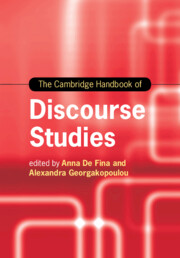Book contents
- The Cambridge Handbook of Discourse Studies
- Cambridge Handbooks in Language and Linguistics
- The Cambridge Handbook of Discourse Studies
- Copyright page
- Contents
- Figures
- Tables
- Contributors
- Preface
- Part I (Con)Textualizing Discourses
- Part II Perspectives and Modes of Analysis
- Part III Discourse Materialities and Embodiment
- Part IV (Trans)Locations and Intersections
- Part V Ethics, Inequality and Inclusion
- 21 Ethics and the Study of Discourse
- 22 Migrants, Citizenship and Language Rights
- 23 Diversity and Inclusion in Education
- 24 Discourse and Racialization
- 25 Discourse and Narrative in Legal Settings: The Political Asylum Process
- 26 Discourse and Religion in Educational Practice
- Part VI Discourses, Publics and Mediatization
- Index
- References
26 - Discourse and Religion in Educational Practice
from Part V - Ethics, Inequality and Inclusion
Published online by Cambridge University Press: 28 September 2020
- The Cambridge Handbook of Discourse Studies
- Cambridge Handbooks in Language and Linguistics
- The Cambridge Handbook of Discourse Studies
- Copyright page
- Contents
- Figures
- Tables
- Contributors
- Preface
- Part I (Con)Textualizing Discourses
- Part II Perspectives and Modes of Analysis
- Part III Discourse Materialities and Embodiment
- Part IV (Trans)Locations and Intersections
- Part V Ethics, Inequality and Inclusion
- 21 Ethics and the Study of Discourse
- 22 Migrants, Citizenship and Language Rights
- 23 Diversity and Inclusion in Education
- 24 Discourse and Racialization
- 25 Discourse and Narrative in Legal Settings: The Political Asylum Process
- 26 Discourse and Religion in Educational Practice
- Part VI Discourses, Publics and Mediatization
- Index
- References
Summary
Despite the existence of long-held binaries between secular and sacred, private and public spaces, school and religious literacies in many contemporary societies, the significance of religion and its relationship to education and society more broadly has become increasingly topical. Yet, it is only recently that the investigation of the nexus of discourse and religion in educational practice has started to receive some scholarly attention. In this chapter, religion is understood as a cultural practice, historically situated and embedded in specific local and global contexts. This view of religion stresses the social alongside the subjective or experiential dimensions. It explores how, through active participation and apprenticeship in culturally appropriate practices and behaviors, often mediated intergenerationally, and the mobilization of linguistic and other semiotic resources but also affective, social and material resources, membership in religious communities is constructed and affirmed. The chapter reviews research strands that have explored different aspects of discourse and religion in educational practice as a growing interdisciplinary field. Research strands have examined the place and purpose of religion in general and evangelical Christianity in particular in English Language Teaching (ELT) programs and the interplay of religion and teaching and learning in a wide range of religious and increasingly secular educational contexts. They provide useful insights for scholars of discourse studies into issues of identity, socialization, pedagogy and language policy.
Keywords
Information
- Type
- Chapter
- Information
- The Cambridge Handbook of Discourse Studies , pp. 571 - 592Publisher: Cambridge University PressPrint publication year: 2020
References
Further Reading
This is the Position Paper for the Perspectives followed by five commentaries.
This is an ethnographic exploration of the intersection of ELT and evangelical Christianity in the context of an English language school with a Bible-based curriculum in Poland.
This edited collection investigates how children and adolescents leverage rich and complex multilingual, multiscriptal and multimodal resources associated with religion for meaning-making and the performance of religious subjectivities in homes, religious education classes, faith-inspired schools and places of worship across a range of religious communities.
